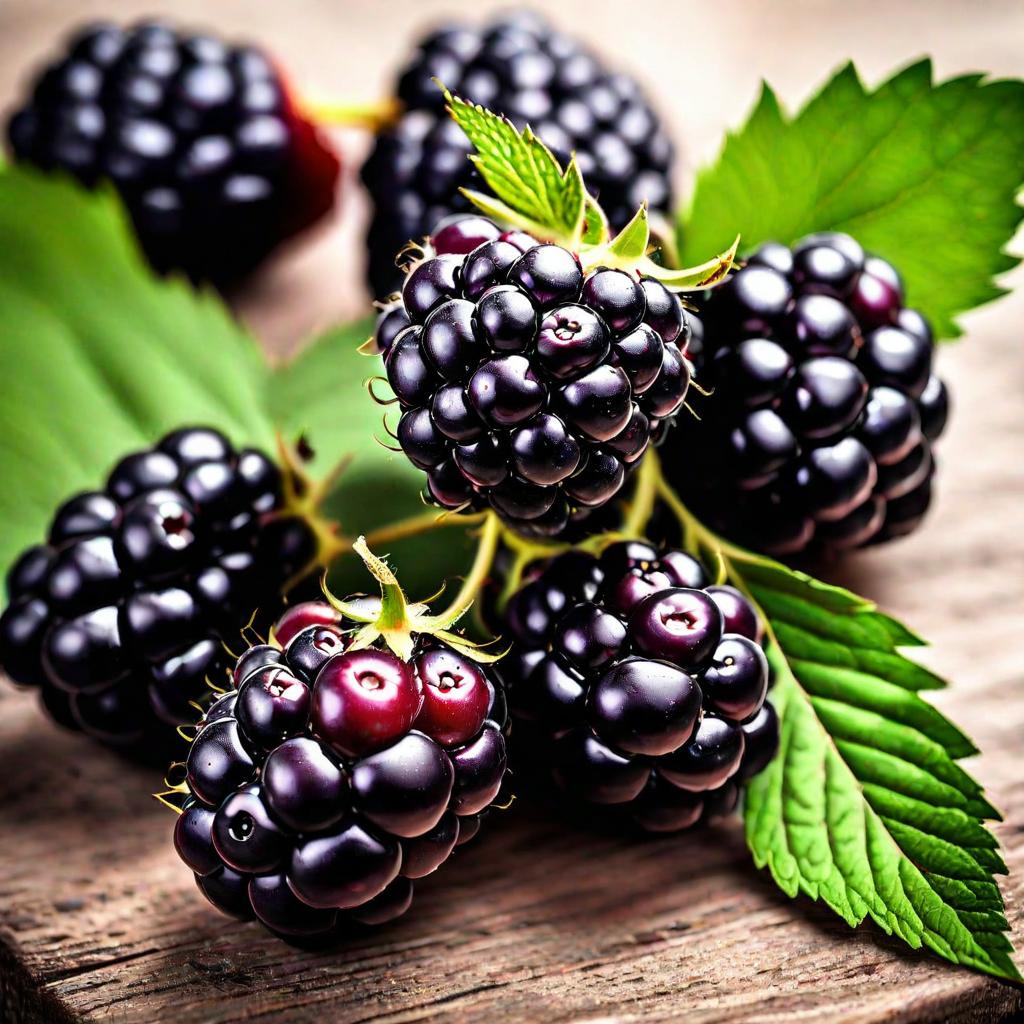“Discover the health benefits of blackberry fruit, rich in antioxidants, vitamins, and fiber. Learn how this delicious fruit supports heart health and boosts immunity.”

Table of Contents
What is Blackberry fruit?
Blackberries are small, dark purple fruits belonging to the Rubus genus. They are known for their sweet and slightly tart flavor. Rich in antioxidants, vitamins (such as C and K), and dietary fiber, blackberries are beneficial for heart health, boosting immunity, and improving digestion. They can be enjoyed fresh, in desserts, jams, or as part of a healthy diet.
Nutritional Profile Of Blackberry Fruit:
Here’s a breakdown of the nutrients in blackberries (per 100 grams):
Macro-Nutrients:
| Macro-Nutrients | Value |
| Calories | 43 |
| Protein | 1.4 grams |
| Carbohydrates | 9.6grams |
| Sugars | 4.9 grams |
| Dietary Fiber | 5.3 grams |
| Fat | 0.5 grams |
Vitamins:
| Vitamins | Daily value |
| Vitamin C | 21 mg (24% of the Daily Value) |
| Vitamin K | 0.0198 mg (16% of the DV) |
| Folate | 0.025 mg (6% of the DV) |
Minerals:
| Minerals | Daily value |
| Calcium | 29 mg (3% of the DV) |
| Iron | 0.6 mg (3% of the DV) |
| Magnesium | 20 mg (5% of the DV) |
| Potassium | 162 mg (3% of the DV) |
Blackberries also contain antioxidants like anthocyanins, which contribute to their health benefits.
Health Benefits of Blackberry fruits:
Here are some health benefits of blackberries:
1) Rich in Antioxidants: Blackberry fruits help in reducing oxidative stress and inflammation as it rich in anthocyanins and vitamin C.
2) Boosts Immunity: Having high vitamin C in Blackberry fruits helps in boosting immune system, as it helps in fighting against infections.
3) Supports Heart Health: Fiber and antioxidants can lower cholesterol levels and improve heart health.
4) Helps in Digestion: High fiber content promotes healthy digestion and regular bowel movements.
5) Improves Brain Health: Antioxidants in blackberries may improve memory and cognitive function.
6) Supports Bone Health: Vitamins K and C, along with calcium and magnesium, contribute to stronger bones.
7) Promotes Skin Health: Vitamin C aids in collagen formation, helping maintain healthy skin.
8) Regulates Blood Sugar: Low glycemic index and fiber help manage blood sugar levels.
Including blackberries in your diet can contribute to overall well-being and disease prevention.
Risks and Considerations:
Here are some risks and considerations for blackberries:
1) Allergies: Some individuals may experience allergic reactions, such as itching or swelling.
2) Digestive Issues: While consuming blackberries in large amount can lead to digestive discomfort to some individuals.
3) Pesticide Residue: Non-organic blackberries may have pesticide residues, so washing them thoroughly is mandatory.
4) Oxalates: Blackberries contain oxalates, which can contribute to kidney stone formation in susceptible individuals.
5) Blood Sugar Impact: While generally low glycemic, consuming large quantities can still affect blood sugar levels, especially in diabetics.
6) Interactions: Blackberries might interact with certain medications, such as blood thinners, due to their vitamin K content.
It’s best to consume them in moderation and consult a healthcare provider if you have specific health concerns.
Facts:
Here are some interesting facts about blackberry fruit:
1) Ancient Fruit: Blackberries have been consumed since ancient times, with evidence of their use dating back thousands of years.
2) Botanical Family: They belong to the Rosaceae family, the same family as roses and apples.
3) Multiple Drupelets: Each blackberry is made up of multiple tiny drupelets, each containing a seed.
4) Seasonal Harvest: Blackberries are typically in season during the late summer months.
5) Wild and Cultivated: They grow wild and are also cultivated in many parts of the world.
6) Symbolism: In some cultures, blackberries symbolize protection and healing.
7) Versatile Use: They can be eaten fresh, used in desserts, jams, and even wines.
8) Nutrient Dense: Blackberries are filled with vitamins, minerals, and antioxidants.
9) Hybrid Varieties: Several hybrid varieties exist, such as the loganberry and boysenberry.
10) Historical Uses: Traditionally used in herbal medicine for treating ailments like digestive issues.
Myths:
Here are some myths about blackberry fruit:
1) Cure-All Remedy: Some believe blackberries can cure all ailments, but while nutritious, they aren’t a magic cure.
2) Always Poisonous: It’s a myth that all blackberries are poisonous after a certain date; this likely stems from folklore.
3) Worsen Arthritis: There’s a belief that blackberries aggravate arthritis due to their acidity, but there’s no scientific evidence supporting this.
4) Only Wild Varieties Are Nutritious: Both cultivated and wild blackberries offer similar health benefits.
5) Attract Bad Luck: Some myths suggest that blackberries bring bad luck when picked at the wrong time, rooted in superstition.
Remember, while myths can be intriguing, it’s essential to rely on scientific evidence for health information.
FAQ’s:
1) What is blackberry fruit good for?
Delicious Blackberries And Their Health Benefits
- Keep your heart healthy.
- Help to strengthen your bones.
- Prevents cancer.
- Diabetic management.
- Good for gut.
- Fights skin problem.
- Boost your brain.
- Healthy pregnancy management.
2) What is blackberry fruit called in India?
The Indian blackberry, popularly known as Jamun, is also called the Java Plum.
3) Can I eat blackberries everyday?
There’s nothing wrong with eating blackberries as one of your daily servings of fruits. But it’s also good to mix things up. With such a variety of fruits available, try to span the rainbow with your choices, advises Zumpano. This way, you get the range of nutrients and antioxidants found in other fruits.
4) Which country fruit is blackberry?
Blackberries are native to several continents, including Asia, Europe, and North and South America. Learing of land for agriculture in North America allowed native blackberries to disperse and hybridize.